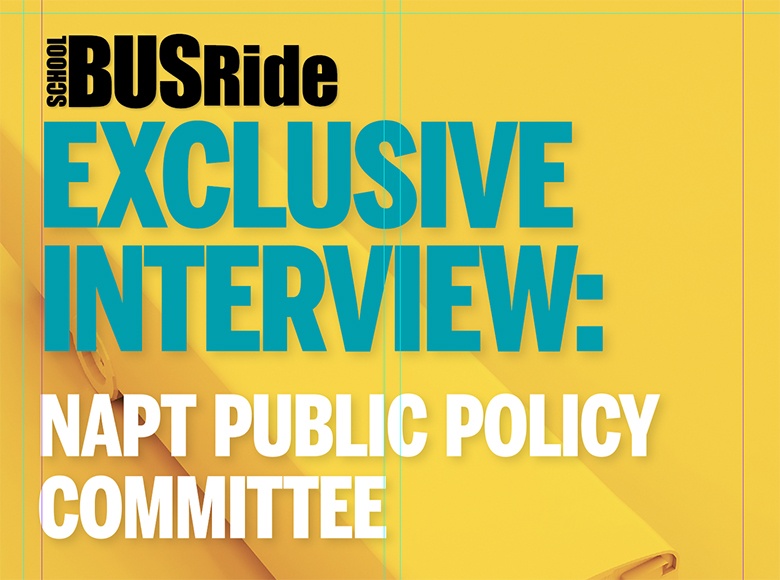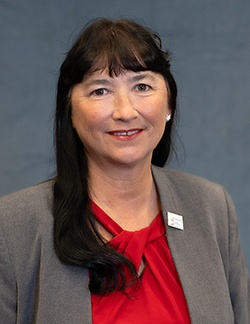
The NAPT Public Policy Committee is conducting important work by keeping members informed of legislation and policies that affect school transportation professionals, as well as crafting the association’s official stances on these issues.
With the new year in full swing, the NAPT Public Policy Committee has endorsed several issues and policies that are vital to NAPT members and their ongoing work to transport children to and from school safely.

NAPT Executive Director and CEO
School BUSRide spoke with NAPT Executive Director and CEO Molly McGee-Hewitt, PhD, CAE; NAPT President Teena Mitchell, CDPT, CSNT; and Peter Mannella, NAPT Public Policy and Communications Liaison; about these developments.
Please explain to our readers, who may not know, what is the purpose of the public policy committee?
Peter Mannella: The NAPT Public Policy Committee’s responsibility is to keep association members and the board informed about matters impacting our profession and work. This ongoing process will lead to the Committee and the Board creating official stances for the association on these crucial matters. To do this work well, it is crucial to understand the thoughts and suggestions of our members and collaborate with industry partners and educational entities.
This year, NAPT leadership has endorsed several additional legislative issues that will complement our federal legislative policy issues as follows:

NAPT President
• Creation of a new Class S License for school bus drivers
• Establishment of a standard national definition of illegal passing
• Improving special education transportation services
• Learning more about the Under the Bus test component exemption
It’s important to note that our work with The School Superintendents Association (AASA) includes, but not limited to, on-going efforts to:
• Fully fund IDEA
• Secure funding support for Wi-Fi on school buses
• Include school transportation in federal cybersecurity legislation

NAPT Public Policy and
Communications Liaison
Public Policy Committee Members
Region I:
Alfred Karam, CDPT, NY
Region II:
Karim Johnson, CDPT, CSNT, VA
Lee Livingston, VA
Joshua Hinerman, CDPT, TN
Region III:
Brian Killian, OH
Melody Coniglio, CDPT, CSNT OH
Region IV:
Kayne Smith, TX
Rosalynn Vann-Jackson, MBA, CDPT, OK
Region V:
Heather Philp, AK
Special Needs:
Linda Bluth, Ed.D.
Industry Representative:
Kimberly Martin, IL
Can you further explain the importance of advocacy, specifically at the national level?
Teena Mitchell: Within our association, our members form the backbone of teams nationally that are responsible for safely transporting students to school. It is because of who our members are that we have the valuable insight into the industry’s specific needs. We need to go beyond just knowing the needs – it is our advocacy that brings a unified, industry-wide voice that will allow us to address the issues impacting student transportation. The four key topics on our Policy Committee’s agenda have the potential to significantly impact on our industry.
Reflecting on Helen Keller’s words, “alone we can do so little; together we can do so much,” emphasizes the power of collaboration. NAPT is honored to have the opportunity to bring the collective voices to our national decision makers to enhance our industry in order to make our vision a reality in which there is a world where every child has access to safe and efficient transportation to school.
Mannella: I’ve always believed that we have a responsibility as professionals to advocate for our work and our objectives, specifically for the safe transportation of America’s children. No one else can speak for us; nor should we allow others to speak for us on issues impacting the members that we serve. The committee views one of its responsibilities as empowering our members to become advocates. This will enhance our initiatives and effectiveness across federal, state, and local levels.
We are dedicated to our role and are committed to enhancing and reinforcing our efforts in this field.
NAPT leadership recently endorsed a legislative agenda. What is the significance of the items on the agenda?
Mannella: Each agenda item addresses the topics and matters frequently discussed by our members during state and national association meetings. They are fundamental issues that we believe require open and honest dialogue to guide us towards a responsible stance. It is crucial not only to voice our opinions but also to create educational initiatives for our members, ensuring everyone is well-informed and actively involved.
For instance, the special needs transportation agenda item is one that has been on the table for years. Enhancing our services for children with disabilities and special needs is crucial. Collaboration between our world and the world of CSEs and special education officials is critical to that. Therefore, it’s not only important to establish channels for this collaboration but also to educate and equip our members to make the most of these opportunities. Each agenda item should be approached with the same level of importance and consideration.
As NAPT President, what guidance would you provide our members on how they can use our advocacy work at the state level?
Mitchell: Unfortunately, all states are not equal when it comes to school transportation. National recognition of our shared pain points will give states a strong foundation on what issues to be aware of and speak to. Furthermore, as Peter previously mentioned, the public policy committee will empower our members to become advocates. By actively engaging in public policy discussions and initiatives, our members can make a real impact and drive positive change. Together, we can work towards a better tomorrow for all.
Would you like to offer anything additional to what Teena & Peter discussed here today?
Molly McGee Hewitt: As the national voice of pupil transportation, NAPT has an obligation to represent our members in matters of legislation and regulation. Our members have expertise that needs to be heard in Washington DC and in state capitals as important issues are discussed. Through four identified initiatives and the efforts of our public policy committee, we are empowered to pursue our agenda with determination and clarity. The NAPT Board has unanimously endorsed these initiatives, and together with our member-driven committee, we aim to play a more significant role in addressing all issues affecting our members, their districts, and organizations.
As we progress, we will continue to expand our efforts in advocacy, policy, and legislation. We are working to educate our members, key decision makers, and our association colleagues in these areas.
We are also proud of our partnerships with AASA and ASBO International, both of which will continue as we advance our efforts.
What is most exciting to me is that we are just getting started!


